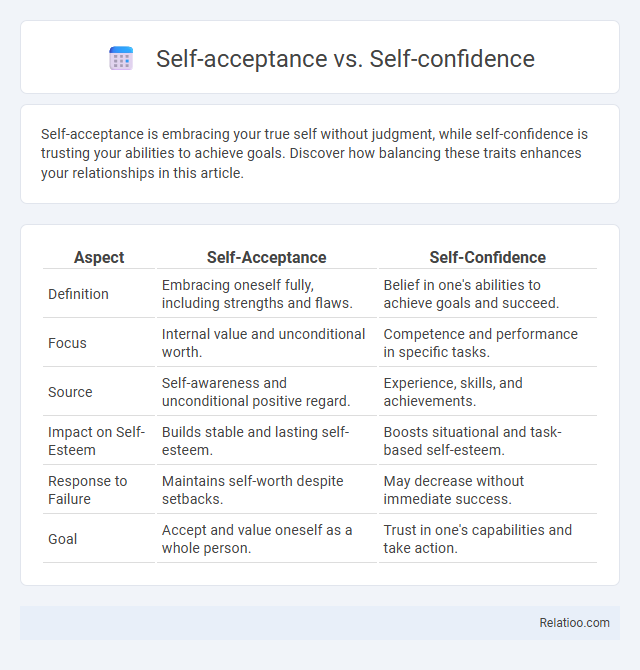Self-acceptance is embracing your true self without judgment, while self-confidence is trusting your abilities to achieve goals. Discover how balancing these traits enhances your relationships in this article.
Table of Comparison
| Aspect | Self-Acceptance | Self-Confidence |
|---|---|---|
| Definition | Embracing oneself fully, including strengths and flaws. | Belief in one's abilities to achieve goals and succeed. |
| Focus | Internal value and unconditional worth. | Competence and performance in specific tasks. |
| Source | Self-awareness and unconditional positive regard. | Experience, skills, and achievements. |
| Impact on Self-Esteem | Builds stable and lasting self-esteem. | Boosts situational and task-based self-esteem. |
| Response to Failure | Maintains self-worth despite setbacks. | May decrease without immediate success. |
| Goal | Accept and value oneself as a whole person. | Trust in one's capabilities and take action. |
Understanding Self-Acceptance
Understanding self-acceptance involves embracing all aspects of oneself, including strengths, weaknesses, and imperfections, without judgment or conditions. Unlike self-confidence, which relates to belief in one's abilities to succeed or perform tasks, self-acceptance fosters unconditional self-worth independent of achievements. Developing self-acceptance enhances emotional resilience, reduces inner criticism, and forms the foundation for authentic self-growth and well-being.
Defining Self-Confidence
Self-confidence is the belief in your own abilities and judgments, distinct from self-acceptance, which involves embracing your true self without judgment, and self-esteem, which reflects your overall sense of self-worth. Developing self-confidence allows you to take risks and face challenges with assurance, relying on your skills rather than external validation. Understanding this distinction helps improve personal growth by balancing how you value yourself with how you act in various situations.
Key Differences Between Self-Acceptance and Self-Confidence
Self-acceptance involves embracing your strengths and weaknesses without judgment, forming the foundation of a healthy self-view, while self-confidence reflects your belief in your abilities to achieve specific goals. Self-acceptance remains constant regardless of external success, whereas self-confidence fluctuates based on experiences and achievements. Understanding these key differences helps you build a resilient mindset that supports personal growth and emotional well-being.
Why Self-Acceptance Matters
Self-acceptance forms the foundation for true self-confidence by allowing you to acknowledge your strengths and weaknesses without judgment, fostering inner peace and resilience. Unlike self-confidence, which fluctuates based on achievements, self-acceptance remains steady, enabling better mental health and authentic self-growth. Prioritizing self-acceptance helps you build a solid sense of identity, improving overall well-being and empowering you to face challenges with compassion.
The Role of Self-Confidence in Personal Growth
Self-confidence plays a crucial role in personal growth by empowering individuals to take risks, embrace challenges, and pursue goals with determination. Unlike self-acceptance, which involves acknowledging one's inherent worth without judgment, self-confidence is the belief in one's abilities to succeed and navigate obstacles effectively. Cultivating self-confidence fosters resilience and motivates continuous learning, driving meaningful progress in both personal and professional development.
How Self-Acceptance Influences Mental Health
Self-acceptance significantly impacts mental health by fostering a non-judgmental and compassionate relationship with Yourself, which reduces stress and anxiety levels. Unlike self-confidence, which relates to belief in Your abilities, self-acceptance involves embracing all aspects of Your identity, including flaws and limitations. This foundational mindset promotes emotional resilience and decreases vulnerability to depression, thus enhancing overall psychological well-being.
Building Genuine Self-Confidence
Building genuine self-confidence stems from a foundation of self-acceptance, where embracing personal strengths and weaknesses cultivates inner authenticity. Unlike superficial confidence, which may rely on external validation, genuine self-confidence is rooted in an honest self-view and resilience. Developing this balanced mindset promotes mental well-being and empowers consistent personal growth.
Balancing Self-Acceptance and Self-Confidence
Balancing self-acceptance and self-confidence involves embracing your inherent worth while actively cultivating belief in your abilities. Self-acceptance means recognizing your strengths and flaws without judgment, fostering inner peace and resilience. Self-confidence drives you to take on challenges and pursue goals, making the synergy between acceptance and confidence essential for personal growth and emotional well-being.
Common Myths and Misconceptions
Self-acceptance, self-confidence, and self-esteem are often confused, but they represent distinct concepts: self-acceptance involves embracing all aspects of oneself unconditionally, self-confidence relates to trust in one's abilities, and self-esteem reflects overall self-worth. Common myths include believing self-confidence requires perfection or external validation, while self-acceptance is sometimes mistaken for complacency or low ambition. Understanding these misconceptions is crucial for personal growth, as true self-acceptance fosters resilience, self-confidence builds competence, and self-esteem provides emotional well-being.
Practical Tips for Cultivating Both Traits
Cultivating self-acceptance involves mindfulness practices such as acknowledging imperfections without judgment and embracing personal values, while building self-confidence requires setting achievable goals and celebrating incremental successes to reinforce a positive self-image. Consistent self-reflection through journaling helps identify limiting beliefs that hinder both traits, enabling targeted cognitive restructuring and emotional resilience. Incorporating daily affirmations and surrounding oneself with supportive relationships further enhances the synergy between self-acceptance and self-confidence for lasting psychological growth.

Infographic: Self-acceptance vs Self-confidence
 relatioo.com
relatioo.com